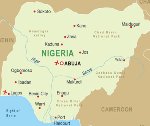Nigeria took the first major step this week toward rewriting its constitution. It is the third such attempt in under a decade to bolster democracy in the country. From the Nigerian capital, Abuja, Gilbert da Costa reports for VOA.
Since returning to civilian rule in 1999, Nigerians have been calling for a new constitution to replace the one drawn up under years of military dictatorship.
The last attempt to pass a new constitution failed in 2006 when the national assembly rejected one of the proposed 120 amendments that would have paved the way for then president Olusegun Obasanjo to run for a third four-year term.
Deputy Senate President, Ike Ekweremadu, who heads the 88-member special constitutional review panel, told VOA the committee will be guided by what it considers is in the best interest of Nigeria.
"I can tell you that no tenure of anybody, be it a local government chairman, governor or president, or even the senator will be extended by one day in that exercise," he said. "That I can assure the whole world. We are going to do a very transparent and professional job."
"We are not going to be carried away by emotions or be distracted by any person's personal view. We are going to put everything on the table and can only be driven by patriotism and the best interest of Nigeria," he added.
The process by which the Nigerian constitution is amended is complex and time-consuming. And it is far from clear whether a consensus could be reached on contentious issues such as the devolution of power between the center and federating states, electoral reforms and revenue allocation.
Nigeria has been faltering from religious and ethnic discord, which some consider a result of a flawed system that has resulted in neglect, poverty and agitation.
The bombing of pipelines and kidnapping of oil workers in the Niger Delta by militants who say they are fighting for a greater share of the region's oil wealth have cut output from Africa's biggest oil industry by a fifth in recent years.
Today, the oil producing region receives 13 percent of oil revenues, a far cry from 100 percent received by other regions in the 1960s and 70s when the country relied on peanuts, palm oil and cocoa.
Abuja
22 November 2008




